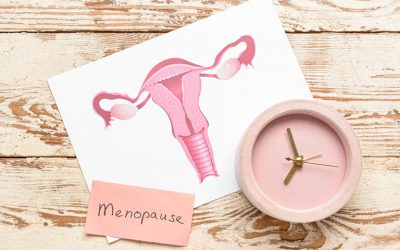Women's Health Info
Gynecologic & Sexual Health During the Menopause Transition
Overview: women’s gynecologic health and menopause
- The Study of Women’s Health Across the Nation (SWAN) has explored various aspects of women’s menopause transition including vaginal, urogenital, and sexual health (VUSH) and functioning over time.
- For example, research shows that menopause experiences vary widely, and symptoms like urinary changes and vaginal dryness are not solely tied to hormonal shifts.
- We now know that factors like age, behavior, mental health, weight changes, and medical conditions, play crucial roles in urinary and vaginal symptoms midlife and older women experience.
- This crucial insight shifts our focus from a solely hormonal treatment approach to a more holistic understanding of urinary and sexual health as women age.
- It also underscores the importance of open communication between women and their healthcare providers on sensitive topics.
Understanding gynecologic & vaginal health changes during the menopause transition
The menopause transition is experienced by more than 1 million women each year and often involves changes in vaginal, urogenital, and sexual health (VUSH). SWAN meticulously tracks these changes among study participants – including symptoms such as painful sex, urinary incontinence, vaginal dryness, among others – through patient-reported evaluations and biomarkers across the menopausal transition.
With a diverse and long-term participant pool, SWAN captures the wide array of experiences among women from diverse backgrounds.. This holistic approach paints a clearer picture of challenges as women age and enter menopause, offering insights that can ultimately shape interventions, policies, and practices for targeted and inclusive support during this transformative phase. The study’s longitudinal nature also tracks the evolution of VUSH over time to provide better understanding of symptoms and experiences.

SWAN is a long-term, multi-racial and ethnic, and multicenter research project that aims to understand the physical, biological, and psychosocial changes that occur in women during the menopause transition. Researchers are examining various aspects, including hormone levels, sleep patterns, cardiovascular health, bone density, and psychological well-being. By studying a diverse population of women over time, SWAN aims to provide comprehensive insights into the menopause transition and its impact on women's health.
SWAN study implications for gynecologic and sexual health
SWAN has helped to shed light on the changes in vaginal health that occur during the menopausal transition. Levels of estrogen circulating in the bloodstream have often been linked to symptoms of menopause. However, when it comes to vaginal health, the research reveals a more complex reality. Hormone levels, tissue sensitivity to estrogen, and many other factors determine who will and who will not have vaginal symptoms with menopause.
Key areas and shifts in understanding are below.
Vaginal dryness and overall vaginal health
Vaginal dryness and intercourse-related discomfort are common complaints during the menopausal transition. SWAN research strengthens evidence that declining estrogen levels contribute to the symptoms of vaginal dryness and sexual pain.
Notably, research shows women who undergo oophorectomy (ovary removal surgery) are at higher risk of developing vaginal dryness compared with those experiencing natural menopause.
Additionally, SWAN’s exploration of the bacterial vaginal microbiome reveals associations with estrogen use, blood levels, BMI (body mass index), and even race/ethnicity but not with most genitourinary symptoms. While research is ongoing, it calls into question whether there is a direct relationship between estrogen and certain symptoms.
Urinary incontinence
In the past, urinary incontinence was often linked to menopause and its hormonal fluctuations. However, SWAN’s findings have debunked this notion. SWAN’s comprehensive data now asserts that urinary symptoms, including incontinence, are extremely common for women over 40 but more closely related to the aging process rather than menopause specifically. That said, other research has identified factors such as pelvic floor muscle dysfunction, medical conditions such as diabetes and weight gain as contributors to these urogenital symptoms during aging.
Dyspareunia (painful intercourse)
A pivotal revelation is the myth-busting conclusion that reduced sexual activity does not inherently lead to sexual pain. In general, the “use it or lose it” concept has been discredited, thanks to SWAN’s longitudinal data analysis.
Additionally, research underscores the benefits of using vaginal lubricants and moisturizers during the perimenopausal phase to reduce sexual dysfunction.
Sexual function and desire
In contrast to the above, other facets of sexual health, such as desire, arousal, and emotional satisfaction, connect more closely with factors like age, overall health, depressive symptoms, anxiety, and personal quality of life. For example, women who placed more weight on the importance of sex and were sexually active, were more fulfilled on their quality of life scores.
Interestingly, research did show that sexual functioning in midlife varied by race/ethnicity. Compared with white women, Chinese and Japanese women reported lower importance of sex, desire, masturbation, arousal, and more sexual pain. Whereas Black women reported greater importance of sex and higher sexual intercourse frequency but more sexual pain, less arousal, less emotional satisfaction, and less physical pleasure. Sexually active Black women also had a smaller decline, whereas Japanese women had a larger decline in sexual functioning before and during menopause.
For those undergoing natural menopause, a decline in sexual functioning is most pronounced around 20 months before the final menstrual period and up to a year later. Women who have had a hysterectomy see a decline in sexual functioning post-surgery. Furthermore, breast cancer survivors and those without a cancer history share similar declines in sexual activity, intercourse frequency, and desire over time. However, among sexually active women, more survivors report experiencing vaginal dryness and pain during intercourse, emphasizing the importance of tailored support for this group.
It’s noteworthy that weight fluctuations don’t significantly affect sexual function during the menopausal transition.
What women should know about their sexual health before and during menopause
Each woman’s experience with menopause and their vaginal, urinary and sexual health is unique. But here are a few key concepts that SWAN and related research has taught us:
- Different racial and ethnic groups might experience menopause and its effects on sexual functioning differently.
- Women should be open about any changes they are experiencing, such as decreased desire or discomfort.
- Vaginal dryness is common; using lubricants can ease pain or discomfort.
- In some cases, hormone therapy may be recommended for vaginal dryness that can affect sexual function but it is not a catchall for treatment during the menopause transition.
- While changing hormone levels in the menopausal transition play a role, other factors like stress, physical health, and emotional well-being also influence sexual function.
- A healthy lifestyle, including regular exercise and a balanced diet, can positively impact overall well-being and sexual health.
Latest vaginal, urogenital, and sexual health news
Relationships Between the Vaginal Microbiota and Genitourinary Syndrome of Menopause Symptoms in Postmenopausal Women
SWAN researchers Dr. Elaine Watjen and Dr. Maria Brooks conducted a study to better understand the possible role of the vaginal microbiome as a cause for pain during intercourse.
Urinary incontinence problematic for many women over 40, study finds
Newly published SWAN research shows that urinary incontinence is problematic for many women over 40.
Benefits of research and what we are still learning
By shedding light on the prevalence of sexual health challenges and normalizing open conversations, research contributes to destigmatizing topics related to sexual health. This, in turn, encourages individuals to seek help without feelings of shame or embarrassment.
As the SWAN study continues to progress, the canvas of knowledge expands, promising new discoveries and insights that will further enrich our understanding of VUSH and beyond. Researchers continue to explore the complex interplay between sexual health, physical function, quality of life, and cognitive health.
Reviewed by:
Elaine Waetjen, MD, Professor, UC Davis School of Medicine
Nanette Santoro, MD, Professor, University of Colorado Denver




